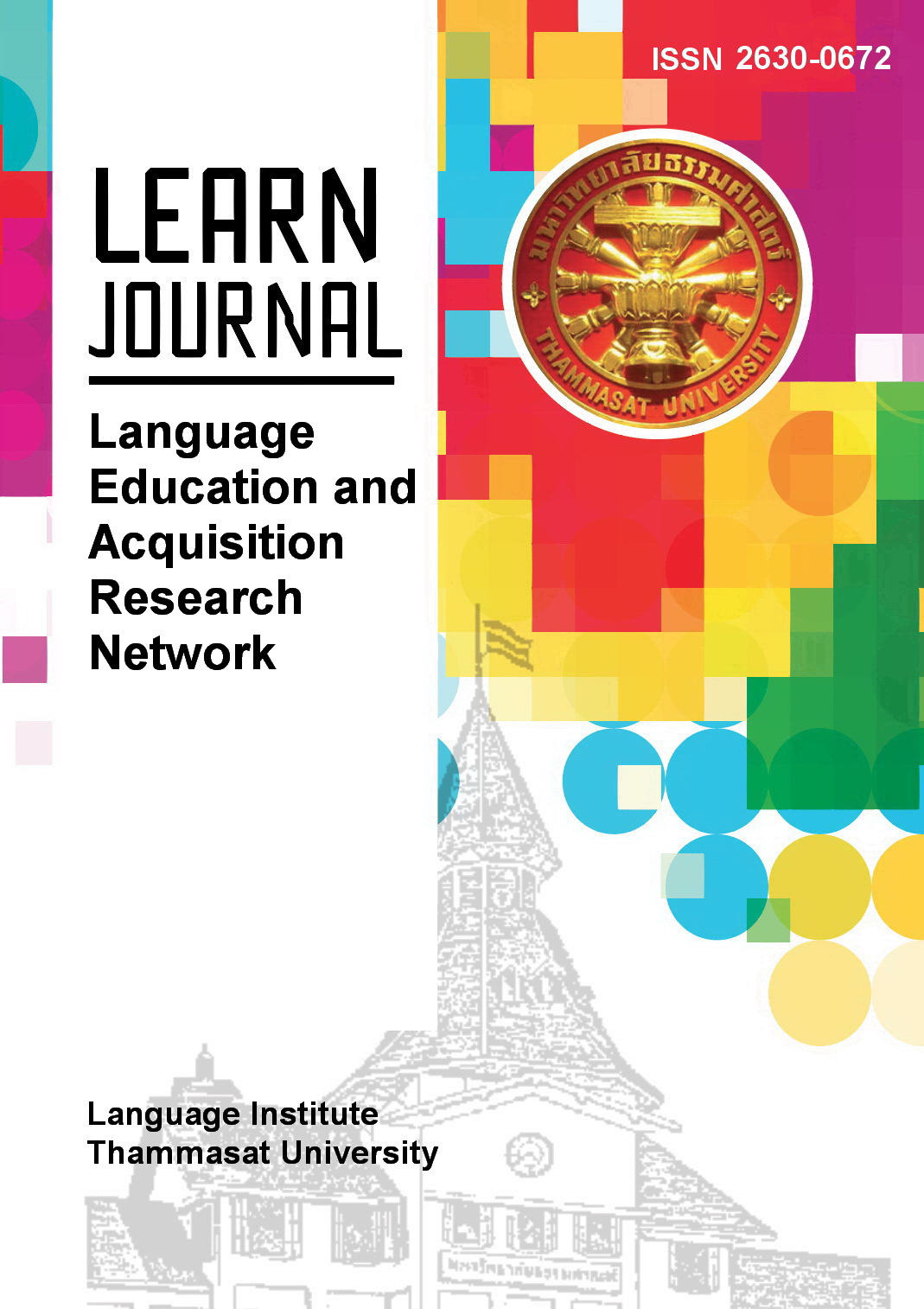The Implementation of a Large-scale Online Extensive Reading Program in Thailand—From Decision-making to Application
Main Article Content
Abstract
This study explores the implementation of a large-scale online extensive reading program (ERP) at a university in Thailand. The program was integrated into two English foundation courses in one academic year and consisted of over 5,000 freshmen and 60 teachers. In-depth interviews were conducted with three administrators who were decision-makers, one ERP coordinator, and 10 classroom teachers. The results reveal that these stakeholders played their parts in making the ERP implementation successful. Also, five factors in successful ERPs, including the integration of extensive reading into the curriculum, the availability of reading materials, the institution-level support, teacher’s roles, and the use of an online platform were present in this ERP. Suggestions to newcomers who plan to implement an ERP are also provided.
Article Details
References
Anandari, C. L. & Iswandari, Y. A. (2019). Extensive reading in Indonesian schools: A successful story. TEFLIN Journal, 30(2), 137-152. http://dx.doi.org/10.15639/teflinjournal.v30i2/137-152
Chang, A. C-S. & Renandya, W. (2017). Current practice of extensive reading in Asia: Teachers’ perceptions. The Reading Matrix: An International Online Journal, 17(1), 40-58.
Charumanee, N. (2014). Idea sharing: The use of read-share-act to promote extensive reading. PASAA: Journal of Language Teaching and Learning in Thailand, 47, 183-198.
Cote, T., & Milliner, B. (2015). Implementing and managing online extensive reading: Student performance and perceptions. IALLT Journal of Language Learning Technology, 45(1), 70-90. https://doi.org/10.17161/iallt.v45i1.8550
Creswell, J. W. (2013). Qualitative inquiry and research design: Choosing among five approaches. SAGE.
Day, R. R. (2015). Extending extensive reading. Reading in a Foreign Language, 27(2), 294-301.
Day, R. R. & Bamford, J. (1998). Extensive reading in the second language classroom. Cambridge University Press.
Day, R. R. & Bamford, J. (2002). Top ten principles for teaching extensive reading. Reading in a Foreign Language, 14(2), 136-141.
Dörnyei, Z. (2007). Researching methods in applied linguistics: Quantitative, qualitative, and mixed methodologies. Oxford University Press.
Extensive Reading Foundation (ERF). (2011). The Extensive Reading Foundation’s guide to extensive reading. ER Foundation. https://erfoundation.org/wordpress/guides/
Kim, M. (2019). The perceptions of students and teachers on the practice of assessment in extensive reading. English Teaching, 74(4), 179- 203.
Kwon, H., Chang, K., Kim, Y., Lee, B., & Jeon, Y. (2017). Factors for successful implementation of extensive reading program using online/offline blended English library system in schools. International Journal of Contents, 13(4), 63-69.
Macalister, J. (2015). Guidelines or commandments? Reconsidering core principles in extensive reading. Reading in a Foreign Language, 27(1), 122-128.
Maipoka, S., & Soontornwipast, K. (2021). Effects of intensive and extensive reading instruction on Thai Primary Students’ English Reading Ability. LEARN Journal: Language Education and Acquisition Research Network, 14(1), 146-175.
Milliner, B. & Cote, T. (2015). Mobile-based extensive reading: An investigation into reluctant readers. International Journal of Computer-Assisted Language Learning and Teaching, 5(4), 1-15.
Milliner, B. (2021). Stories of avid extensive readers in a university-level EFL course. Journal of Extensive Reading, 8(1), 1-16.
Nation, P. & Waring, R. (2020). Teaching extensive reading in another language. Routledge.
Ng, Q. R., Renandya, W. A., & Chong, M. Y. C. (2019). Extensive reading: Theory, research and implementation. TEFLIN Journal, 30(2), 171-186. http://dx.doi.org/10.15639/teflinjournal.v30i2/171-186
Pratontep, C. (2007). The effects of extensive reading and levels of reading proficiency on Thai university students' English reading comprehension using a self-regulated learning framework. [Doctoral dissertation, Department of English as an International Language, Chulalongkorn University, Thailand].
Puripunyavanich, M. (2021). Revealing university students’ attitudes toward online extensive reading in Thailand. REFLections, 28(2), 267-292.
Renandya, W. A. & Day, R. (2020). The primacy of extensive reading and listening: Putting theory into practice. Willy Renandya. https://willyrenandya.com/the-primacy-of-extensive-reading-and-listening/
Renandya, W. A., Hidayati, M. & Ivone, F. M. (2020). Top ten implementation issues. Willy Renandya. https://willyrenandya.com/extensive-reading-top-ten-implementation-issues/
Ro, E. (2016). Exploring teachers’ practices and students’ perceptions of the extensive reading approach in EAP reading classes. Journal of English for Academic Purposes, 22, 31-41.
Robb, T. (2018). An introduction to online sites for extensive reading. The Electronic Journal for English as a Second Language, 22(1), 1-16.
Robb, T. & Kano, M. (2013). Effective extensive reading outside the classroom: A large-scale experiment. Reading in a Foreign Language, 25(2), 234-247.
Satitporn, N. (1995). An experimental study of the role of extensive reading on the ability to acquire vocabulary and motivation of M5 students at Thawangphapittayakom School in Nan Province. [M.A. Thesis, Mahidol University, Thailand].
Tamrackitkun, K. (2010). Extensive reading: An empirical study of its effects on EFL Thai students’ reading comprehension, reading fluency and attitudes [Doctoral Dissertation, University of Salford, United Kingdom]. http://usir.salford.ac.uk/id/eprint/11924/1/Thesis.pdf
Tien, C. (2015). A large-scale study on extensive reading program for non- English majors: Factors and attitudes. International Journal of Applied Linguistics and English Literature, 4(4), 46-54.
Zhou, J. & Day, R. R. (2021). Online extensive reading in EAP courses. Reading in a Foreign Language, 33(1), 103-125.


